January 2009 in “Journal of Zhengzhou University” LAIC cream can improve acne by making skin thinner and softer.
CDPDFM can improve acne symptoms in rabbit ears.
Different treatments change the strength and flexibility of human hair.
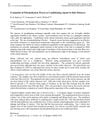 August 2005 in “Microscopy and Microanalysis”
August 2005 in “Microscopy and Microanalysis” Polymethylene wax in hair relaxers makes hair smooth and shiny with less damage.
December 1988 in “Anatomia, Histologia, Embryologia” Frequent hair dye use caused significant hair and skin damage and affected the dogs' behavior.
 May 2024 in “International Journal For Multidisciplinary Research”
May 2024 in “International Journal For Multidisciplinary Research” The herbal hair cream helps protect and improve hair health.
 May 2024 in “Frontiers in medicine”
May 2024 in “Frontiers in medicine” A genetic mutation in the LIPH gene causes tightly curled hair that stops growing in some Japanese individuals.
October 2015 in “Cosmetic Dermatology” Hair styling products and tools help improve hair's look and manageability but can damage hair if used incorrectly.
 62 citations,
January 2004 in “The journal of investigative dermatology/Journal of investigative dermatology”
62 citations,
January 2004 in “The journal of investigative dermatology/Journal of investigative dermatology” A second domain of high sulfur KAP genes on chromosome 21q23 is crucial for hair structure.
 47 citations,
June 1996 in “International Journal of Legal Medicine”
47 citations,
June 1996 in “International Journal of Legal Medicine” Hair analysis for drugs needs a better understanding of how drugs enter hair, considering factors like hair structure and pigmentation.
41 citations,
January 1992 in “Journal of medical genetics” The study found that males with KFSD had severe skin and eye symptoms, while female carriers had milder symptoms.
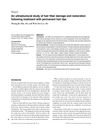 40 citations,
February 2002 in “International Journal of Dermatology”
40 citations,
February 2002 in “International Journal of Dermatology” Permanent hair dye damages hair but it mostly recovers after 8 weeks; using certain hair care products can help repair it.
 36 citations,
August 2011 in “Journal of dermatological science”
36 citations,
August 2011 in “Journal of dermatological science” Human hair has a protective lipid layer that can be damaged by moisture and treatments, affecting hair growth and health.
30 citations,
August 2008 in “The journal of investigative dermatology/Journal of investigative dermatology” TGase 3 helps build hair structure by forming strong bonds between proteins.
30 citations,
November 2005 in “The journal of investigative dermatology. Symposium proceedings/The Journal of investigative dermatology symposium proceedings” The lipid in human hair follicles acts as a barrier, similar to the skin's lipid layer.
25 citations,
February 2007 in “Forensic science international” Different hair cleaning methods caused varying levels of damage to the hair's outer layer.
 23 citations,
August 2019 in “Proceedings of the National Academy of Sciences of the United States of America”
23 citations,
August 2019 in “Proceedings of the National Academy of Sciences of the United States of America” Pollution exposure speeds up hair damage.
 15 citations,
July 2004 in “Journal of morphology”
15 citations,
July 2004 in “Journal of morphology” Monotreme hair structure and protein distribution are similar to other mammals, but their inner root sheath cornifies differently, suggesting a unique evolution from reptile skin.
13 citations,
January 2001 in “Pediatric dermatology” A dark-haired Chinese girl had hair that looked banded under certain light but was normal under a microscope.
11 citations,
January 2016 in “Biointerphases” The hair's outermost surface has multiple layers of lipids and proteins.
8 citations,
January 2016 in “Skin research and technology” The 12-point scale is better for evaluating small changes in hair condition after using hair care products.
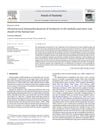 7 citations,
December 2011 in “Annals of anatomy”
7 citations,
December 2011 in “Annals of anatomy” Involucrin helps strengthen the inner parts of human hair.
6 citations,
June 1976 in “Journal of ultrastructure research” Keratinized wool cells still have some organelles like lysosomes and mitochondria.
 5 citations,
May 2021 in “International Journal of Cosmetic Science”
5 citations,
May 2021 in “International Journal of Cosmetic Science” Healthy scalp leads to better hair quality and less damage.
5 citations,
July 2010 in “Journal of life sciences” Gray hair has more continuous medullation and a higher medullary diameter than black hair.
5 citations,
January 1992 Silicones in shampoos make hair smoother, easier to manage, and reduce friction.
4 citations,
April 2018 in “The journal of pediatrics/The Journal of pediatrics” A 6-year-old girl's inability to grow her hair long was due to Loose Anagen Hair Syndrome, which causes hair to shed easily and may improve with age.
3 citations,
October 2006 in “Journal of dermatology” X-ray microscopy can non-invasively show hair structure changes after treatments, but it's less detailed than TEM and needs improvement.
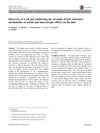 2 citations,
February 2016 in “Journal of sol-gel science and technology”
2 citations,
February 2016 in “Journal of sol-gel science and technology” A small molecule can strengthen fine hair, making it more resistant and natural-feeling.
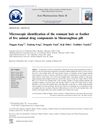 2 citations,
May 2012 in “Acta pharmaceutica sinica B”
2 citations,
May 2012 in “Acta pharmaceutica sinica B” The study found unique microscopic features for hair or feather in five animal ingredients in Shenrongbian pill.












